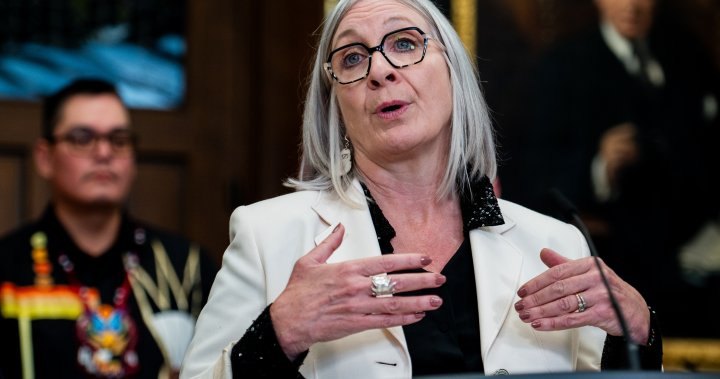Canada’s Indigenous Services minister refused to say Monday if non-Indigenous companies that won contracts by claiming to be Indigenous should pay back the value of contracts that were meant for First Nations, Inuit or Métis businesses.
Under questioning by Conservative MPs during a parliamentary committee meeting, Patty Hajdu repeatedly stressed the value of the Indigenous Business Directory – a database of companies connecting Indigenous businesses to the lucrative world of federal contracts.
A months-long Global News investigation, in partnership with researchers at First Nations University of Canada, raised questions about whether some of those companies are truly owned and controlled by Indigenous people.
The investigation revealed significant loopholes in the Procurement Strategy for Indigenous Business (PSIB), a federal program designed to give five per cent of all government contracts to First Nations, Métis and Inuit companies, as a form of economic reconciliation reflective of Indigenous people making up five percent of the overall population.
Federal documents reviewed by Global News warned as early as 1999 that “fronts” and “shell companies” could exploit and ultimately undermine the program.

Conservative MP Garnett Genuis called the abuse a case of “cultural appropriation leading to financial misappropriation.”

Get breaking National news
For news impacting Canada and around the world, sign up for breaking news alerts delivered directly to you when they happen.
“You have people that are pretending to be Indigenous in order to get money that they’re not supposed to be accessing,” Genuis said.
“Do you see the problem here and do you agree that your government needs to be accountable for this failure?”
Hajdu deflected and challenged whether Conservative interest in the issue is genuine.
“What I see clearly is a plan for Conservative cuts around a program that is actually about Indigenous economic development,” Hajdu shot back. She suggested Genuis might view the initiative as “too woke.”
But Hajdu admitted that the PSIB program is currently “under review,” specifically about the challenge of how the federal government determines if a company is actually Indigenous owned.
She told the standing committee on Indigenous and Northern Affairs that they’re working with Indigenous groups to address issues around defining Indigeneity but didn’t disclose details.
Global News previously reported that until two years ago, companies could simply self-identify as Indigenous to access the contracts.
“And I’ll just say this: proving Indigeneity is deeply rooted in a colonial structure of deciding who is Indigenous or not,” Hajdu said.
The PSIB was created by the Chrétien Liberals in 1996 in attempt to help connect Indigenous businesses to federal contracting.
Under the current Liberal government, departments are required to set aside at least five per cent of their procurement spending for companies owned and controlled by Indigenous people, or joint ventures partnering with Indigenous companies.
That works out to approximately $1.6 billion annually.

Global News approached 10 of the federal government’s top listed Indigenous contractors for specific information about their First Nations, Inuit or Métis links. Four declined to speak with reporters or provided a response that did not specify the community or group they belonged to.
Those four contractors received approximately $455 million in federal contracts since 2022, although there is no indication that they did not qualify under PSIB rules.
The investigation also found that an official with Indigenous Services Canada (ISC), the department Hajdu oversees, told an Indigenous tribal council that they could upload any document, including a “picture of a bunny,” to qualify as a contractor. The federal government later clarified that no, a “picture of a bunny” is not sufficient documentation and apologized to the tribal council the official had spoken to.
Hajdu explained that over time, some companies with Indigenous partners could change and reform. She also said that companies that once were Indigenous owned and controlled, but have since changed their management structure, could still apply for federal work.
© 2024 Global News, a division of Corus Entertainment Inc.




